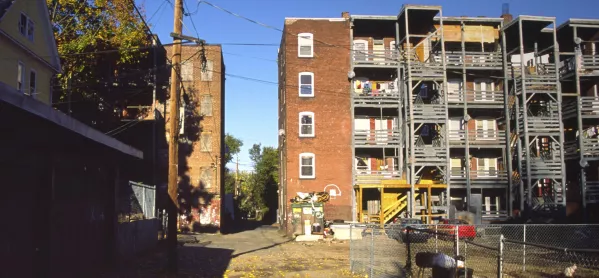Inner-city schools: all gangs, EAL issues, poverty of aspiration, knife arches and on-site police officers, while rural schools revel in calm, committed students and lunch boxes full of hummus, right? Not in my experience.
So called ‘tough’ schools - defined usually by inner-city locations with high levels of students from low income families - have many issues. Students in these schools often face language acquisition problems, inadequate housing, poor nutrition, lack of parental support and enormous pressures from negative social influences.
And yet, many of these children succeed. Their individual determination to improve their lives, and the dedication of hard-working teachers, must be credited, but the truth must be acknowledged that behind this success, behind the schools applauded for breaking the cycle, lies an enormous amount of money.
Money should be spent on our young people. But there is poverty outside of London, outside of the cities, and this is ignored by the government’s blinkered labelling system. While these inner-city schools flourish despite the odds, our rural schools are careering towards disaster.
Plenty of support
My experience of inner city schools - eight years teaching in Tower Hamlets - is that they are incredibly well funded and supported. There is a dynamism that comes from appropriate staffing levels and the input of local businesses: inner city schools, in acknowledging the huge number of welfare issues among their student body, have money to employ pastoral heads of year, social workers, student support officers, and businesses offer support through altruistic lunch time reading partners, work experience opportunities and mentoring schemes.
In recognition of challenging behaviour, there are more senior leaders administering strict regimes, police officers running mediation meetings, full-time cover supervisors to protect PPA time and fully staffed internal exclusion units.
In addition to standard free school meals, nutritional disadvantages are lessoned through breakfast clubs, funded pre-exam snack packs and free after-school cookery classes where ingredients are provided.
There is budget for rewards, for end-of-term treats, for fully paid and inclusive trips - even residential - all aimed at redressing the inequalities these children face.
Teaching at a tough inner city school is a wonderful thing.
Lack of funding
However, in rural schools, it feels that none of these things exist.
One or two overworked members of staff attempt to meet all the pastoral and social needs of the student body who often display alarming levels of anxiety; full costs of trips are passed directly on to students, meaning that half of them don’t attend and many are cancelled altogether. Additional duties such as internal exclusion are passed on to teaching staff and therefore avoided wherever possible; cover is stretched to the legal limit and reward systems flounder under lack of budget.
Additionally, when the student body has to depart in one sudden rush on limited rural bus services, many opportunities are lost: extra-curricular clubs lack members; after-school detentions become laborious and fraught when a parent must be summoned to collect their child; minor and even sometimes quite major infringements are left to the following day to be resolved, and all of these things combine to create schools that are barely meeting the needs of their pupils.
Extra services at extra cost could help alleviate some of these issues.
It is not as if these kids are any less in need than their inner-city peers. There is poverty in rural communities, there are still children who arrive without breakfast, whose parents for whatever reason, do not support them, children who live in damp housing with no space to do homework - there just isn’t the funding and the infrastructure to provide better opportunities for them.
Inner city schools aren’t tough. There is enough help to ensure most problems can be overcome. Rural schools, that’s where the toughest teaching really is.
The writer is a teacher in the south of England




